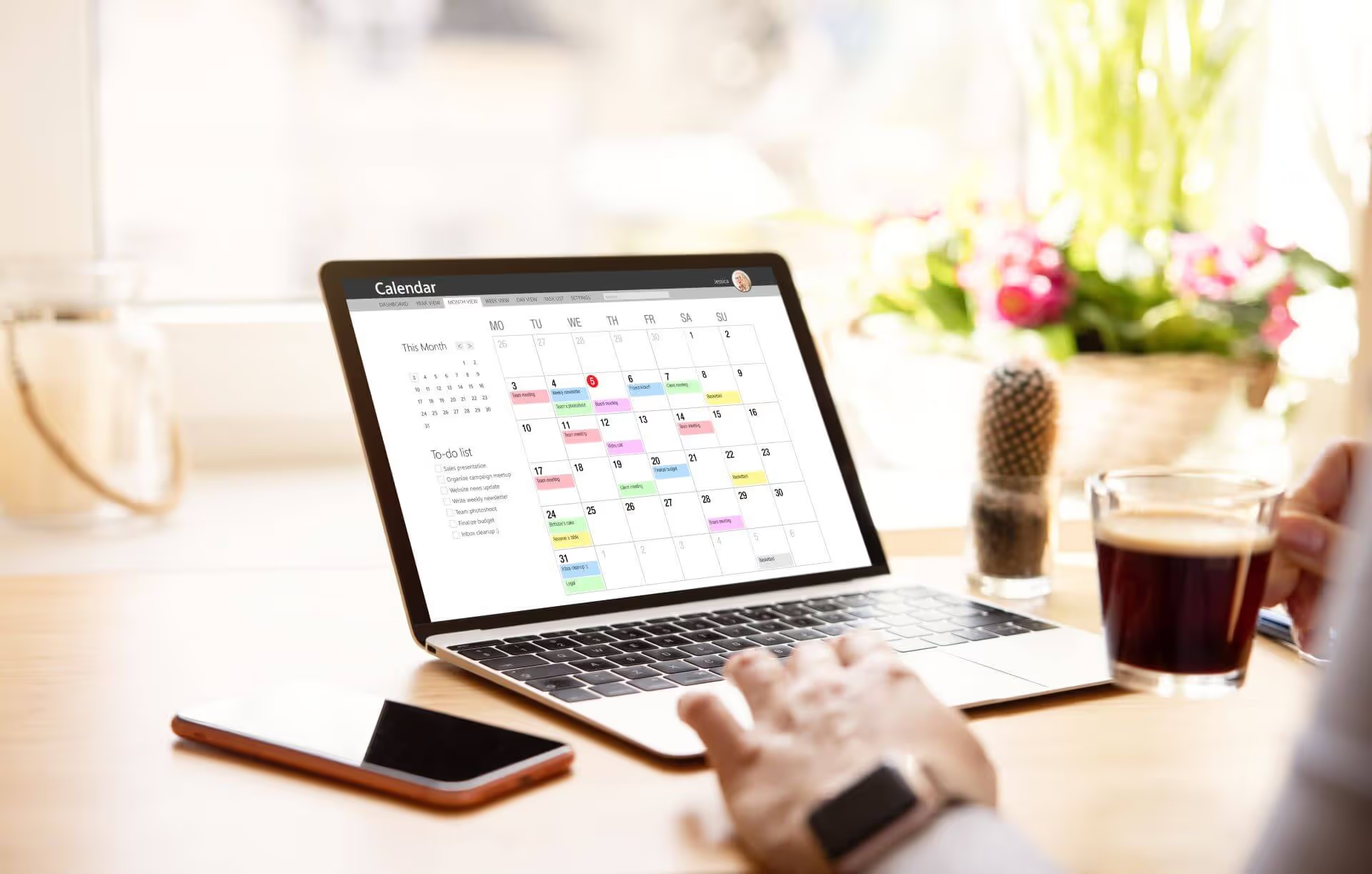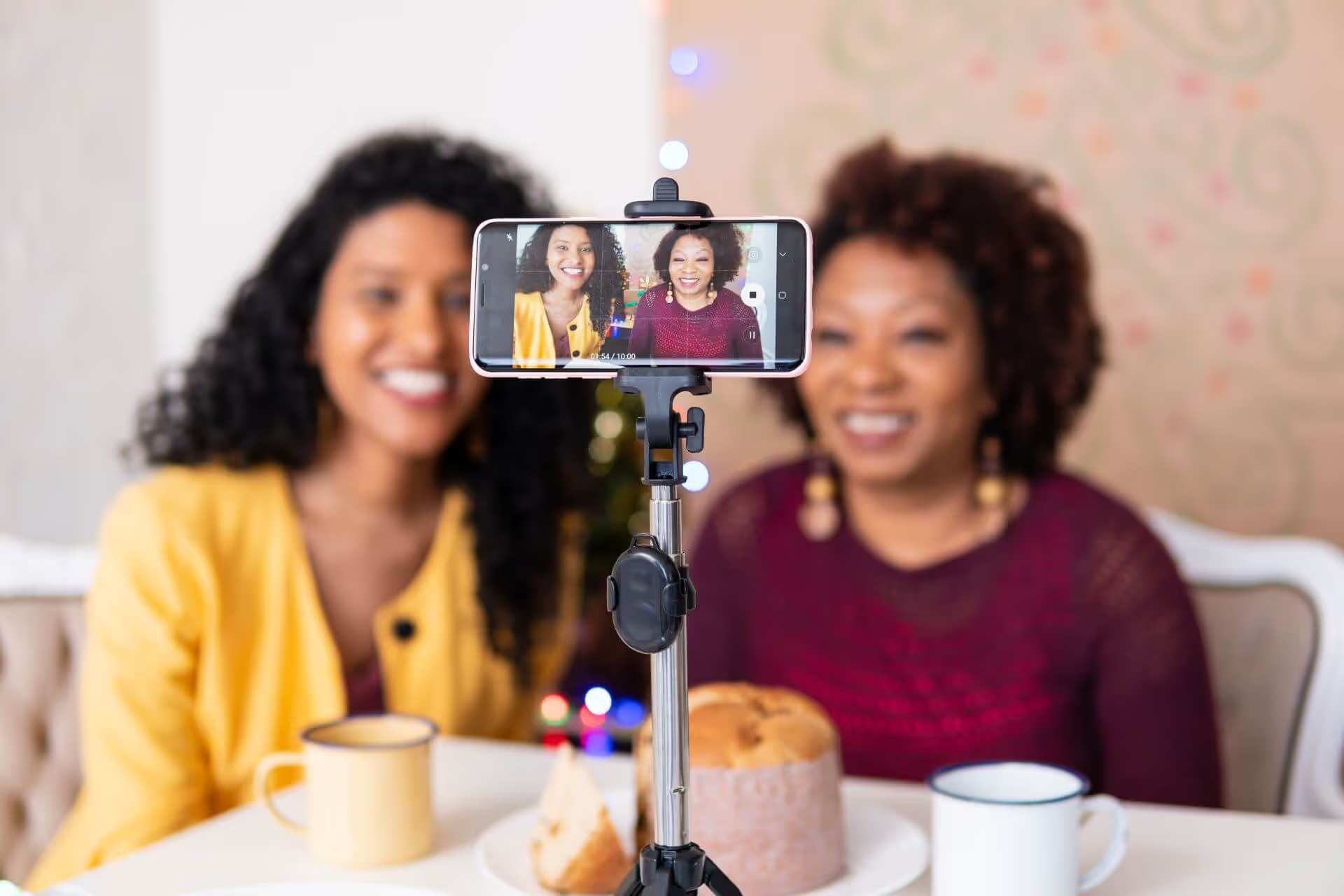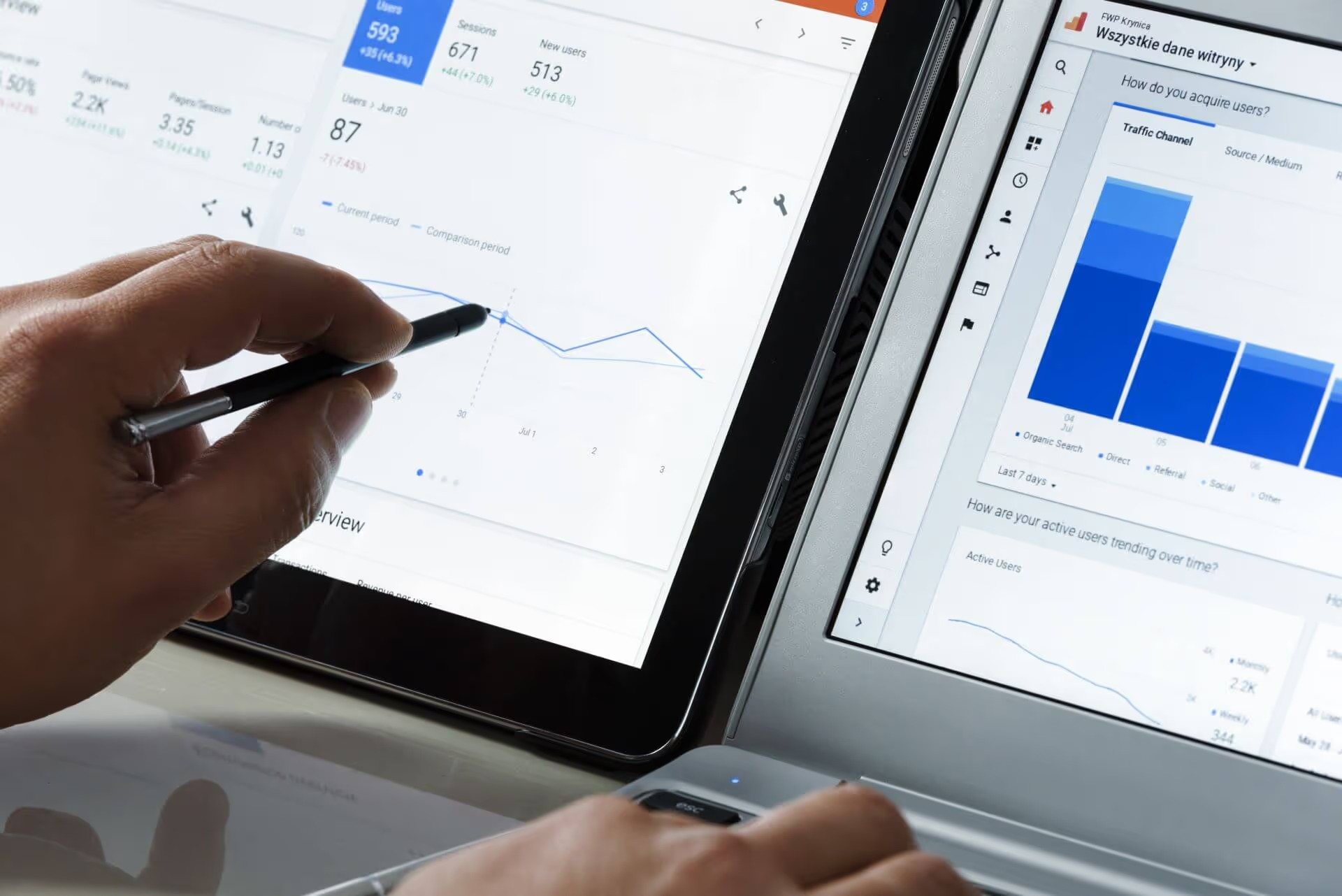Whether you're hosting a small local gathering or a large-scale conference, promoting your event effectively requires a solid digital marketing strategy. There are so many options available online that it can be easy to get overwhelmed, but with the right tools and strategies you can reach your target audience and maximise attendance.
How will you promote the event? This guide will provide you with tips and strategies to help you create excitement, engage potential attendees, and ensure your event is a resounding success.
How to promote your event
Promoting an event online requires an approach that leverages various platforms and techniques. From building a strong online presence to using social media and influencer marketing, each step plays a role in reaching and engaging your audience.
Creating a strong online presence
Website
The foundation of any successful online event promotion is a dedicated event website or landing page. This serves as the go-to place for all information related to your event, providing potential attendees with everything they need to know in one location. A well-designed website or landing page not only helps to establish credibility but also makes it easier for people to find your event through search engines and social media.
Essential elements
When creating your event website or landing page, it's important to include all the essential details that potential attendees will need. This includes:
- Event Details: Clearly state the date, time, and location of the event, along with any relevant logistical information like parking arrangements or relevant bus routes.
- Registration Information: Make it easy for attendees to register by including a prominent registration button or form. Consider offering different ticket types or early bird pricing to incentivise early sign-ups.
- Schedule: Provide a detailed schedule of the event, including key sessions, speakers, and activities. This helps attendees plan their day and highlights the value of attending.
- Speakers and Performers: Provide details on the expertise and credentials of your speakers or performers with bios, headshots, and links to their social media profiles.
SEO optimisation
Search engine optimisation (SEO) is crucial for ensuring that your event website ranks well on search engines like Google. Here are some tips to optimise your website for SEO:
- Keyword Research: Identify relevant keywords that potential attendees might use to search for events like yours. Incorporate these keywords naturally into your website's content, including titles, headings, and meta descriptions.
- Mobile-Friendly Design: Ensure that your website is mobile-friendly, as many users will access it from their smartphones. A responsive design that adapts to different screen sizes is essential.
- Fast Loading Speed: A slow-loading website can put visitors off. Optimise images, use a reliable hosting service, and minimise the use of heavy scripts to improve loading times.
- Internal Linking: Include links to other relevant pages on your website, such as blog posts or past event highlights, to keep visitors engaged and improve SEO.
Event pages on social media
Social media platforms like Facebook, LinkedIn, and Eventbrite offer tools for promoting your event and reaching a wider audience. Creating event pages on these platforms allows you to:
- Reach a Broader Audience: Social media platforms have very large user bases, giving you access to potential attendees who may not have discovered your event otherwise.
- Engage with Attendees: Event pages enable you to interact with attendees, answer questions, and provide up-to-date information.
- Shareable Content: Encourage attendees to share the event with their networks, amplifying your reach.
- RSVP Tracking: Many platforms allow you to track RSVPs, giving you insights into how many people are planning to attend.

Utilising social media
Choosing the right platforms
Not all social media platforms are built for the same purpose or audience, and each has its own unique strengths where you can use different event promotion ideas. To effectively promote your event, it's important to choose the platforms that are best suited for your target audience. Consider the following:
- Facebook: Ideal for a broad audience, Facebook is great for creating event pages, sharing updates, and running ads.
- Instagram: With its focus on visual content, Instagram is perfect for sharing event-related photos, videos, and stories. It's particularly effective for reaching younger audiences.
- LinkedIn: If your event is professional or industry-focused, LinkedIn is the go-to platform for connecting with business professionals and industry leaders.
- Twitter/X: Known for its real-time updates, X is useful for sharing event news, engaging in conversations, and using hashtags to increase visibility.
Content strategy
Creating a content strategy for social media involves posting a variety of content types to keep your audience engaged and excited about the event. Some ideas include:
- Teasers: Build anticipation by posting teaser content, such as sneak peeks of the venue, behind-the-scenes photos, or hints about special announcements.
- Behind-the-Scenes: Show your audience what goes into planning the event with behind-the-scenes content, such as team meetings, setup, and preparation.
- Speaker Highlights: Feature your speakers or performers with dedicated posts that showcase their expertise and what they’ll bring to the event.
- User-Generated Content: Encourage attendees to share their own content related to the event, such as past event experiences or why they’re excited to attend. Repost and share this content on your channels.
Engagement techniques
Engaging with your audience on social media helps build excitement and creates a sense of community around your event. Some effective engagement techniques include:
- Contests: Run social media contests where participants can win free tickets or exclusive event-related merchandise. This encourages shares, likes, and overall engagement.
- Polls: Use polls to involve your audience in decision-making, such as choosing a theme or voting on session topics.
- Live Q&A Sessions: Host live Q&A sessions with event speakers or organisers to answer questions and build rapport with your audience.
- Interactive Posts: Create interactive posts, such as quizzes or challenges, that encourage users to participate and share their results.
Leveraging influencer marketing
Identifying influencers
Influencer marketing can be a powerful tool for promoting your event, especially if you partner with influencers who have a strong connection with your target audience. Finding and engaging with the right influencers is the first step. To find the right influencers:
- Research: Look for influencers who are active in your industry or niche and who have a following that aligns with your target audience.
- Engagement: Prioritise influencers who have high engagement rates, as this indicates a strong connection with their followers.
- Relevance: Ensure that the influencer’s content and values align with your event’s theme and message.
Collaboration strategies
Once you’ve identified potential influencers, it’s important to collaborate with them in a way that feels authentic and engaging. Try the following strategies:
- Co-Created Content: Work with influencers to create content that resonates with both their audience and yours. This could include sponsored posts, Instagram takeovers, Ask Me Anything, or behind-the-scenes videos.
- Event Promotion: Encourage influencers to promote your event through their channels by sharing details, countdowns, or exclusive offers.
- Live Coverage: Invite influencers to attend your event and provide live coverage on their social media platforms, giving their followers a glimpse of the experience.

Measuring impact
To ensure that your influencer marketing efforts are paying off, it’s essential to track and measure their impact. Key metrics to monitor include:
- Engagement Rates: Track likes, comments, shares, and overall engagement on the influencer’s posts related to your event.
- Traffic and Registrations: Use unique tracking links or promo codes to measure how much traffic and registrations are generated by the influencer’s promotions.
- ROI: Calculate the return on investment (ROI) by comparing the cost of the influencer collaboration with the revenue or value generated from their promotion.
Email marketing campaigns
Building an email list
Email marketing is still one of the most effective ways to promote an event, but it all starts with building a strong email list. Here are some strategies to grow your list:
- Lead Magnets: Offer a valuable resource, such as a free eBook or webinar, in exchange for email sign-ups.
- Registration Pages: Encourage event registrants to opt-in to your email list during the registration process.
- Social Media: Use social media platforms to promote your email list, offering exclusive content or discounts to subscribers.
- Website Pop-ups: Use strategically timed pop-ups on your event website to capture visitor emails. Offering a discount on tickets for subscribing can be a strong incentive.
Email content
Now that you have a solid email list, it’s important to create emails that engage and inform your audience. Consider sending the following types of emails:
- Invitations: Send personalised invitations to your email list, highlighting why they should attend your event.
- Reminders: As the event date approaches, send reminder emails to keep your event top-of-mind.
- Exclusive Offers: Offer exclusive discounts or early access to your email subscribers as a way to incentivise registration.
- Updates: Keep your audience informed with regular updates, such as new speaker announcements or changes to the event schedule.
Personalisation
Personalisation maximises the effectiveness of your email campaigns. By tailoring your emails to different segments of your audience, you can deliver more relevant content, increasing engagement and conversion rates:
- Segmentation: Divide your email list into segments based on factors like demographics, previous event attendance, or expressed interests. For example, you could create separate campaigns for first-time attendees and returning participants.
- Personalised Subject Lines: Use the recipient’s name or reference their specific interests in the subject line to increase open rates.
- Dynamic Content: Incorporate dynamic content blocks that change based on the recipient’s profile, such as showing different speakers or sessions depending on their interests.
- Behavioural Triggers: Set up automated emails triggered by specific actions, like signing up for updates or abandoning the registration process. These timely messages can prompt users to complete their registration or take other desired actions.
Paid advertising
Social media ads
Social media platforms offer ad targeting options, making them ideal for promoting events:
- Facebook and Instagram: Use Meta’s detailed targeting options to create ads that reach specific demographics, interests, and behaviours. Instagram’s visual nature makes it perfect for eye-catching ads featuring your event’s highlights.
- LinkedIn: If your event is B2B or industry-focused, LinkedIn ads are highly effective. Target by job title, industry, or company size to reach decision-makers and professionals.
- Twitter/X: X’s real-time platform makes it a good option for promoting time-sensitive content, like early bird ticket sales or event countdowns. Use hashtags to increase visibility and join relevant conversations.
Google ads
Google Ads can significantly enhance your event’s visibility by targeting users actively searching for events like yours:
- Search Ads: Bid on keywords related to your event’s theme, location, or speakers. When potential attendees search for these terms, your ad will appear at the top of the search results, driving relevant traffic to your site.
- Display Ads: Use Google’s display network to show visually appealing banner ads on relevant websites. These ads can help increase brand awareness and retarget previous visitors to your event page who haven’t yet registered.
Retargeting campaigns
Retargeting is a powerful strategy that involves serving targeted advertisements to people who have previously interacted with your website, social media pages, or other online content but haven't completed a desired action, such as making a purchase or registering for an event:
- Website Retargeting: Use cookies to track visitors to your event website, then display targeted ads to them as they browse other sites. This keeps your event top-of-mind and encourages them to return and complete their registration.
- Social Media Retargeting: Similarly, you can retarget users who have engaged with your event’s social media pages or posts. This approach often yields high conversion rates, as these users have already shown interest in your event.
Content marketing
Blog Posts
Blog posts are an excellent way to attract and inform your target audience:
- Educational Content: Write articles that address common questions or challenges related to your event’s theme. This not only drives traffic to your site but also positions your event as a valuable resource.
- Event Previews: Create blog posts that offer sneak peeks into the event, such as interviews with speakers, highlights of the agenda, or behind-the-scenes looks at the planning process.
- SEO Optimisation: Optimise your blog posts with relevant keywords to improve search engine rankings, helping potential attendees discover your event organically.
Guest posts
Guest blogging is a strategic way to expand your reach and establish credibility:
- Targeted Outreach: Identify popular industry blogs and websites that cater to your event’s target audience. Pitch guest post ideas that align with their content while promoting your event subtly.
- Backlinks: Ensure your guest posts include links back to your event website, boosting your SEO and driving traffic.
- Cross-Promotion: Collaborate with other blogs’ editors to cross-promote the content, increasing visibility on both your platforms.
Videos and webinars
Videos and webinars are powerful tools for engaging your audience and generating excitement:
- Promotional Videos: Create short, engaging videos that highlight what attendees can expect from your event. Share these across social media, your website, and in email campaigns to capture attention.
- Webinars: Host pre-event webinars featuring speakers or panel discussions that offer a taste of the event’s content. Webinars can attract a broader audience, many of whom may decide to attend the event.
Partnerships and cross-promotions
Collaborating with sponsors
Sponsors can offer more than just financial support, they can also help promote your event:
- Co-Branded Content: Work with sponsors to create co-branded content, such as blog posts, videos, or social media campaigns, that promotes both the event and the sponsor.
- Shared Audiences: Leverage your sponsor’s audience by having them promote the event through their channels, expanding your reach to a new group of potential attendees.
Industry partnerships
Industry partnerships can enhance your event’s credibility and visibility:
- Joint Promotions: Partner with industry associations or related businesses to co-promote the event. This could involve sharing email lists, social media shout-outs, or co-hosted webinars.
- Discount Offers: Offer special discounts to members of industry associations or partner businesses, incentivising their participation and expanding your audience.
Cross-promotion strategies
Cross-promotion involves collaborating with other businesses or events to mutually benefit from each other’s audiences:
- Social Media Shout-Outs: Share each other’s content on social media to increase exposure.
- Email Campaigns: Feature your partner’s event or offer in your email campaigns, and have them do the same for you.
- Content Collaborations: Create joint content, such as blog posts or videos, that promotes both parties and adds value to your audiences.
Engaging your audience
Interactive content
Interactive content is highly engaging and can help you gather valuable insights about your audience:
- Polls and Surveys: Use polls and surveys to engage your audience while gathering feedback on topics like preferred sessions or event logistics.
- Quizzes: Create fun, shareable quizzes related to your event’s theme. Quizzes can be a great way to generate excitement and increase social media shares.

User-generated content
User-generated content (UGC) adds authenticity to your promotional efforts:
- Photo Contests: Encourage attendees to share photos related to the event or its theme. Offer incentives like discounts or prizes for the best submissions.
- Social Media Campaigns: Create a hashtag for your event and encourage attendees to use it when sharing their experiences. Repost UGC on your channels to build a sense of community.
Community building
Building a community around your event can enhance engagement and foster long-term relationships with your audience.
- Online Forums and Groups: Create dedicated online spaces, such as a Facebook group or LinkedIn forum, where attendees can discuss event-related topics, network, and ask questions. Regularly engaging with these communities by posting updates or initiating discussions can keep the conversation active.
- Discussion Boards: Set up discussion boards on your event website where attendees can interact with each other and with event organisers.
Utilising event listing sites
Popular event listing platforms
Event listing sites are crucial for reaching a broader audience. Platforms like Eventbrite, Meetup, and local event directories allow potential attendees to discover your event through searches and recommendations.
- Eventbrite and Meetup: These platforms are widely used and can attract both local and international attendees. Listing your event on these sites can increase visibility, particularly if the event aligns with the interests of the platform's user base.
- Local Directories: Don’t overlook local event directories, especially if your event is region-specific. Local listings can attract attendees who might not be reached through broader platforms.
Optimisation tips
To maximise the impact of your event listings, ensure they are fully optimised:
- Complete Information: Provide all necessary details, including event title, date, location, ticketing information, and a compelling description. Complete listings are more likely to be featured prominently on the platform.
- Keywords: Use relevant keywords in your event title and description to improve searchability. Consider what potential attendees might search for and incorporate those terms naturally into your listing.
- Visuals: Include high-quality images or videos to make your listing stand out. Visual content can significantly increase engagement and interest.
Tracking and analysing performance
Analytics tools
Tracking and analysing the performance of your event promotion efforts will help you understand what works and where improvements are needed.
- Google Analytics: Monitor website traffic, sources, and behaviour to see how well your online presence is driving interest.
- Social Media Insights: Use the analytics tools provided by social media platforms to track engagement rates, shares, and click-throughs. This data can inform your social media strategy and help you focus on what resonates with your audience.
- Email Marketing Analytics: This data can help you refine your messaging and targeting for better results.

Key metrics to monitor
- Website Traffic: High traffic indicates strong interest, while low conversion rates might suggest a need to improve your call to action or registration process.
- Social Media Engagement: High engagement on social media shows that your content resonates with the audience. Low engagement may require adjustments in content type or platform focus.
- Email Metrics: High open rates suggest effective subject lines, while low click-through rates may indicate that the content isn’t compelling enough.
- Registration Numbers: Ultimately, the number of registrations is the most direct indicator of success. Regularly monitor these numbers and adjust strategies as needed to meet your goals.
Adjusting strategies
Data-driven adjustments can significantly improve your event promotion. If a particular strategy isn’t delivering the expected results, don’t hesitate to tweak it based on your insights.
- A/B Testing: Experiment with different headlines, visuals, or ad placements to see what works best.
- Content Focus: Shift focus to content types or platforms that yield the highest engagement.
- Budget Reallocation: Direct more budget towards channels that are delivering the highest ROI.
Final thoughts
Promoting an event online requires a multifaceted approach, combining content creation, audience engagement, and performance tracking. By leveraging the right tools and strategies, you can maximise your event's visibility and ensure it reaches its full potential. Remember, continual analysis and adjustment are key to refining your approach and achieving the best possible results.
Need help promoting your event?
Your event could be a big success if you partner with an events digital marketing agency like Boost. Contact us today to plan your digital marketing strategy.




